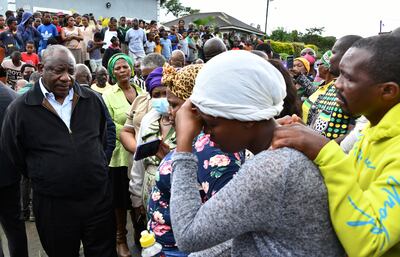South African President Cyril Ramaphosa visited victims of devastating east coast floods as the death toll passed 300.
Heavy rains washed away roads and disrupted shipping in one of Africa's busiest ports in KwaZulu-Natal province.
Mr Ramaphosa visited families who had lost loved ones, including a family with four children, after floods and mudslides ravaged their homes on Tuesday.
“You're not alone … we'll do everything in our power to see how we can help,” Mr Ramaphosa said. “Even though your hearts are in pain, we're here for you.”
By Wednesday the death toll had reached 306, according to a statement by the Department of Co-operative Governance for KwaZulu-Natal. Municipal services such as electricity, water and refuse removal have resumed in some areas, it said.
South Africa's north-eastern neighbour, Mozambique, has suffered a series of devastating floods over the past decade, including one last month that killed more than 50 people.
Scientists predict global warming could mean Africa's south-east coast is hit harder by such weather systems in the next few decades.
“You're battling one of the biggest incidents we've seen and we thought this only happens in other countries, like Mozambique or Zimbabwe,” Mr Ramaphosa told victims.

Meli Sokela, a victim who lost his child in the flood, told Reuters that when the area was inundated on Monday night he could hear sounds like a thunderstorm hitting the roof of his house, and immediately afterwards the walls of his home crumbled.
“My neighbours, they tried to assist me, it took two hours. After two hours I survived, but unfortunately my child did not survive,” he said.
A report by the Intergovernmental Panel on Climate Change in February said that humanity was far from ready even to cope with the climate change that is already baked into the system by decades of fossil fuel-burning and deforestation. It urged the world to increase investment in adaptation.
“None of this is surprising but it's absolutely devastating. Can you imagine the cost to people's lives? The roads, the ports. … it's massive,” Melissa Fourie, a commissioner on Mr Ramaphosa's Presidential Climate Commission and head of the Centre for Environmental Rights, told Reuters.
“In South Africa, we're still talking about the transition from fossil fuels as if it were optional. We have to stop [burning them]. We have to start preparing for the climate change that we already have.”











